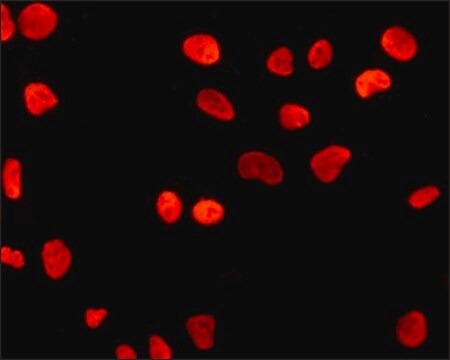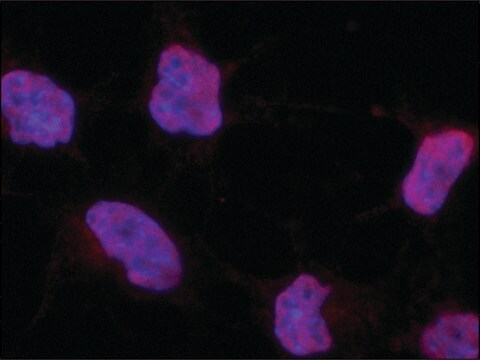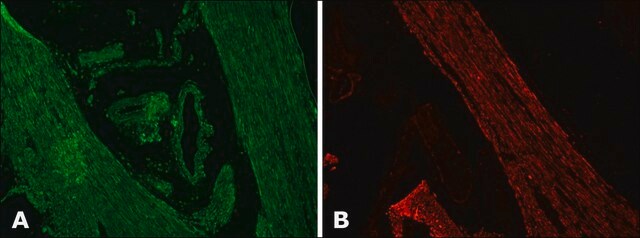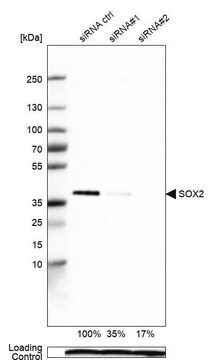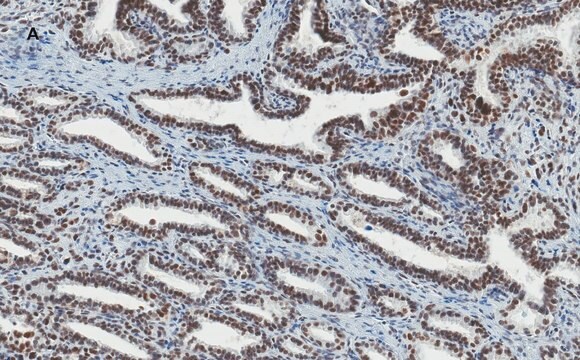MAB4419
Anti-OCT-4 [POU5F1] Antibody, clone 7F9.2
clone 7F9.2, from mouse
Sinónimos:
Octamer-binding transcription factor 3, POU class 5 homeobox 1, POU domain class 5, transcription factor 1, POU-type homeodomain-containing DNA-binding protein, octamer-binding transcription factor-3
About This Item
Productos recomendados
biological source
mouse
Quality Level
antibody form
purified immunoglobulin
antibody product type
primary antibodies
clone
7F9.2, monoclonal
species reactivity
human, mouse
technique(s)
flow cytometry: suitable
immunocytochemistry: suitable
western blot: suitable
input
sample type: human embryonic stem cell(s)
sample type induced pluripotent stem cell(s)
sample type: mouse embryonic stem cell(s)
isotype
IgG1κ
NCBI accession no.
UniProt accession no.
shipped in
wet ice
target post-translational modification
unmodified
Gene Information
human ... POU5F1(5460)
mouse ... Pou5F1(18999)
General description
Specificity
Immunogen
Application
Stem Cell Research
Pluripotent & Early Differentiation
Flow Cytometry: Recommended working dilution is 2 µg/mL.
Immunocytochemistry: Recommended working dilution is 1:100 – 1: 200.
Target description
Linkage
Physical form
Storage and Stability
Other Notes
Disclaimer
¿No encuentra el producto adecuado?
Pruebe nuestro Herramienta de selección de productos.
Storage Class
12 - Non Combustible Liquids
wgk_germany
WGK 1
flash_point_f
Not applicable
flash_point_c
Not applicable
Certificados de análisis (COA)
Busque Certificados de análisis (COA) introduciendo el número de lote del producto. Los números de lote se encuentran en la etiqueta del producto después de las palabras «Lot» o «Batch»
¿Ya tiene este producto?
Encuentre la documentación para los productos que ha comprado recientemente en la Biblioteca de documentos.
Artículos
Skip weekend feedings. Defined serum-free and feeder-free expansion media for human pluripotent stem cells (ES and iPS cells). See publications and protocols.
The Simplicon™ RNA Reprogramming Technology is a next generation reprogramming system that uses a single synthetic, polycistronic self-replicating RNA strand engineered to mimic cellular RNA to generate human iPS cells.
Human iPSC neural differentiation media and protocols used to generate neural stem cells, neurons and glial cell types.
Nuestro equipo de científicos tiene experiencia en todas las áreas de investigación: Ciencias de la vida, Ciencia de los materiales, Síntesis química, Cromatografía, Analítica y muchas otras.
Póngase en contacto con el Servicio técnico